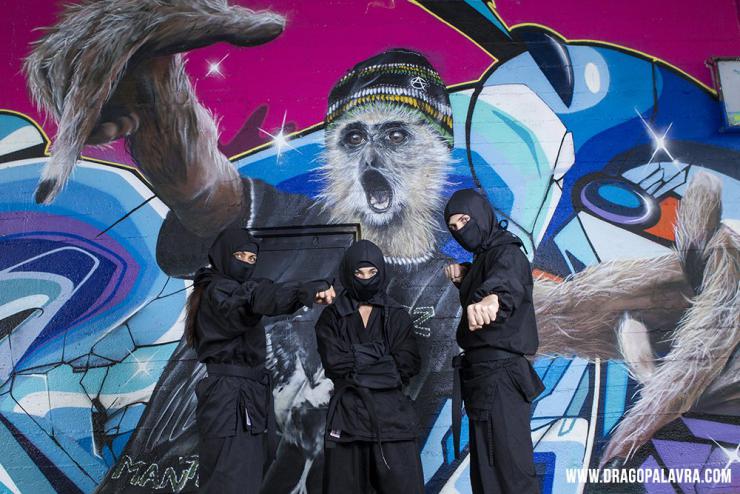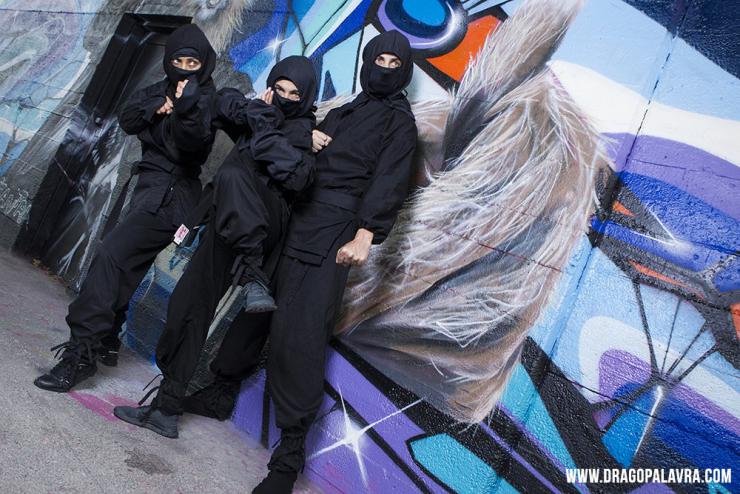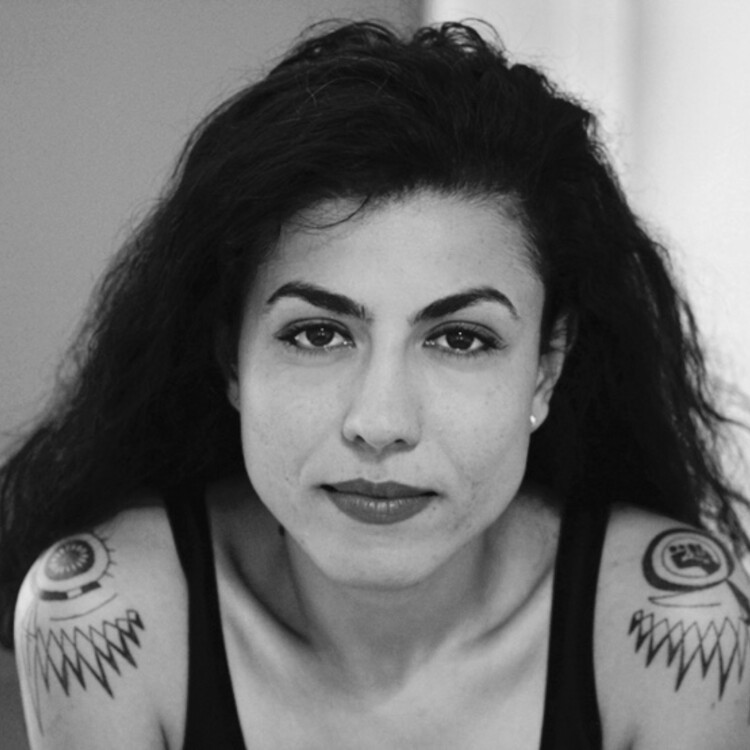Roma Artists Telling Stories of Resistance, Not Victimhood
I first heard about Mindj Panther, two Roma sisters and actresses who act, rap, and make political art interventions, in 2014, during a trip to Vienna where I was performing. I was about to create my Roma feminist theatre company Giuvlipen in Bucharest, Romania and I was amazed to discover that something similar already existed in Austria. Maybe this was a time when we, the new generation of Roma actresses from Europe, felt a deep need to find a place for our own art; to invent a new type of theatre where we can explore our identity and discuss the political situation of Roma in Europe.
Three years later, I came together with Sandra and Simonida Selimovic of Mindj Panther and other Roma actors from Germany, Sweden, and the United Kingdom in a production in Berlin at Maxim Gorki Theatre, under the direction of Yael Ronen. Our show, Roma Armee, started from Sandra and Simonida’s idea to create an utopian army for Roma people in order to fight oppression. This was the first time our art was showcased in a mainstream theatre. We performed Roma Armee twice a month for an audience of at least four hundred people per show, and we feel that—finally—our art got recognition in the European cultural scene.
Mihaela Drăgan: How did you come up with the idea of creating a Roma theatre in Austria?
Sandra Selimovic: We first had the idea in 2010. Being Roma in Vienna, we experienced a lot of stereotypes in the theatre environment. Because we have dark skin and dark hair, we received the cliché roles like beggar, maid, thief, or poor immigrant. They were always the problematic characters—they were never powerful, the heroes, or the main characters. So we decided: we want to choose how our identity is represented here.
'Being Roma in Vienna, we experienced a lot of stereotypes in the theatre environment… So we decided: we want to choose how our identity is represented here.'—Sandra Selimovic
Mihaela: The name of your theatre company is “Romano Svato.” What does it mean?
Simonida Selimovic: In Romani language it means “the Roma word.” We chose this name because we wanted to promote our language. There are so many Roma children that do not speak Romani so we wanted to empower them to learn. We also rap in Romani.
Mihaela: What kind of theatre performances do you produce in Romano Svato? What topics do you raise?
Sandra: Our topics are related to Roma people, racism, sexism, and our history. The first Romano Svato show was in 2011 and it was called Gypsy Stop Dancing. It was inspired by the history of the Sinti (German Roma) boxer Johann Trollmann who was killed by the Nazis in a concentration camp. In 1933, Trollmann became champion but after only one week, his title was taken back for “bad boxing,” or boxing in a Gypsy style. As a sign of resistance, Trollmann went to the ring for his last professional fight with dyed blonde hair and his body covered with flour as a way to mock them.
Inspired by this story, we placed the action in the present, in the fascist Hungary of Victor Orban, because we wanted to show that the oppression against Roma is still going on. We changed the main character to a Roma woman boxer. Our goal was to change the representation of Roma women and to say that a Romni (Roma woman) can also box even if the people do not associate us with sports but with the cliché roles of the mother and domestic wife.
Our second theatre performance, Astoria, is about classism in Austria and discusses the relationship between poverty and marginalized minorities.

Mihaela: What is the representation of Roma in art?
Simonida: I am struggling with this, and I am really sad. On one hand, I am an activist and on the other, I am an actress. For example, I was invited to play a beggar in a big series in Austria. I accepted at first because I have to work and I hoped that I could change something to improve the image. Sometimes I feel that I have to compromise, but in this case, in the end I decided to refuse the part. They were not willing to change the stereotypes.
Mihaela: Do you feel that you would contradict your work at Romano Svato by accepting roles like that? You produce a lot of knowledge and empowerment for your community, but then you sometimes have to accept stereotypical roles in order to make a living. How do you negotiate your career between these pressures?
Simonida: I always try to communicate with directors. I cannot accept everything, but if I see that they are open to listening to me, I am more likely to accept the role.
Mihaela: Speaking of poverty, I read an article recently about a Kenyan artist who was criticizing other Kenyan artists who capitalize off of their personal sad stories of poverty instead of being creative. What is your opinion about speaking about poverty in art, considering that it is a reality for Roma people but also one of the main clichés about us?
Sandra: Of course, a connection exists between the lack of access to schools or jobs and the Roma identity. The most discriminated against people are also the poorest. But we don’t want to capitalize the interest in our art in this way because to expose personal stories of poverty is the easiest thing you can do as an artist. For us it would be problematic to do it. Moreover, we have to recognize that being artists we are privileged as long as we can gain money from our art. We have seen a lot of poor Roma exposed in documentary movies. For example, this year a Roma guy, who played in a movie and won the Berlinale award for best actor, died. He was happy to play in this movie, afterwards he had to sell the statue due to poverty and then he died. Meanwhile the gadje (non-Roma) directors make their movies and nothing is changing for the poor Roma.
Mihaela: What is your specific method of producing new works about Roma? Do you work with documented real stories or do you create fiction?
Simonida: It is a mix of unknown Roma history with personal stories and fiction. We are interested in telling these stories in a positive way, to present Roma heroes and role models. We want to tell stories of resistance, not of victimhood. The way in which you look at a story depends a lot. Is our oppressive history a victimhood story? We like to say that we have a history of resistance; our whole history is about survival. We need to be empowered by our past, not stay in the position of the victim, which is a passive one. We have to transform pain into the desire and the anger needed in order to fight against oppression. We write a lot of angry rap songs mixed with a lot of black humor.
Mihaela: So when did you become interested in hip-hop? When did you create Mindj Panther, your band?
Sandra: In 2013 we were part of a big project created around the idea of being rebellious. The name of the project was Rebelodrom. That year the election law changed the minimum age for voting from eighteen to sixteen. Therefore the strategy of the far right wing party was to attract young people and to invite them to gatherings where they could drink beer and party. They posted pictures on Instagram and they tried to make far-right extremism look cool. The head of the party published a rap song online and the video became popular even though it was bad hip hop which only tried to encouraged people to vote for his party. So we decided to do a contra-rap, a good one, making fun of his rap. Afterwards, we infiltrated their gatherings and performed it there. We came at their gatherings dressed as Ninjas and created diversion. Once we came with a five-meter long banner: “Austria, we love you and we will never leave you!” They started to get violent towards us, to push us out from their gathering. Two men came with a lighter to burn our banner. So our action was not longer than a few minutes but it was successful! We repeated this action two or three times. Every time they had a meeting in a public square we infiltrated in our Ninja costumes and disturbed it with performative actions or just playing our rap songs. Thanks God, they did not enter the Parliament! Starting that moment, just before the elections, we began to organize concerts in the park. We wrote songs about racism and identity.

Mihaela: Why did you choose to name the band Mindj Panther?
Simonida: Mindj means pussy in Romani language. When we created the group, the case of Pussy Riot, who were imprisoned in Russia, became very popular. So in solidarity with them we chose the same word but translated to our language. We wanted to say that to be a woman or to have a vagina is great, even if the others told us that we should be ashamed of it. It is also a play on words from “Ninja,” we wanted to say that the new Ninja is the Minja.
Sandra: I loved the Ninja cartoons in my childhood. I have always wished to be a Ninja, I loved to copy their fighting choreographies and many times I fought with Simonida until we were bleeding. We enjoyed a lot the fighting choreographies! And “Panther” comes obviously from Black Panthers. Together, the two words express the idea of having Roma women fighters. We wanted to be provocative and dangerous at the same time. There was a time when we felt that we have to do something to be listened to.
Michaela: What made you promote the idea of “Roma Armee” even if it did not refer to a concrete army but to an artistic approach?
Simonida: It is about Roma people getting organized and powerful. Of course, to have an Army is an exaggerated and provocative idea because we do not have a country, therefore there is no defense force. But we can play with the idea of defending ourselves and creating Roma Armee Factions in order to fight oppression. It says: “You have to take us seriously!” It does not speak necessarily about the idea of using physical violence but more about the metaphor of fighting back. We also thought of organizing fighting lessons in order to defend ourselves. Why should we always be the persons who are just receiving violence but are never responding to it? It is the right time for us to use space to explore our anger. The stage can be a good place for this.
Mihaela: Roma Armee has become the name of a big theatre show in Berlin with Romani actors from all over Europe. What was the very beginning of this concept in Austria?
Sandra: Romano Svato and Mindj Panther exist under the big concept called Roma Armee Fraktion. The main goal was to launch the idea of a Roma revolution. We did a small performance where we combined rap with video installations and speeches about the theme of having a Roma Revolution and getting out from victimhood. We wanted to show that Roma could also be dangerous and stand up for their rights. Our weakness is needed by racists to continue to oppress us but we are not so weak as they think we are. We had enough. At that time, I think people were shocked but they also felt very positive.
'It is tiring to always fight for a space for your art…But at the same time we feel that is our duty to do this work for the next generation.'—Sandra Selimovic
Mihaela: How do you relate to feminism in your performances?
Simonida: In a very intersectional way. For example, Heroes is about three refugee women from different countries who are in a prison waiting to be deported to their countries. One is a lesbian from Iran, the second pretends she is from Syria in order to receive asylum but she is Egyptian, and the third one is a Roma, an economic refugee—the less accepted kind of refugee. The show discusses topics like “the good refugee” and who deserves to be protected as an immigrant.
Mihaela: Do you have a space for Romano Svato?
Sandra: We are an independent theatre group and we do not have our own space, we perform in different places. Because our audience is small, our goal is to enter the state theatres, mainstream theatres like Gorki, where we are now and where we can reach another kind of public, not just the progressive leftist feminists who are our main audience. The mainstream is politically ignorant regarding the Roma so there is a need to perform for them.
Mihaela: What are the stereotypes that you confront as Roma actresses?
Simonida: The first stereotype that we confront is that we are not professional actresses or that we are just some repressed women. We received stupid questions that were hurting us. In the beginning, we felt like aliens in the eyes of the Gadje; they did not believe we are professional actresses.
Sandra: They do not expect that I am a lesbian, that I am out and proud. And still, many times they do not take seriously our political art, it is difficult to penetrate the state theatres, the majority of the actors are white, they still do Othello in blackface in Austria.
Mihaela: How can you express your art in such a racist context? Do you feel tired of always needing to prove that your art is valuable?
Sandra: To be honest, I am. It is tiring to always fight for a space for your art and to always explain why you need this space, why it is important to have it. But at the same time we feel that is our duty to do this work for the next generation.
Mihaela: Do you also think about the next generation of Roma actors? Because in Romania, when my colleagues and me started Giuvlipen there was nothing similar, no other Roma theatre company. So we felt that we did a pioneer work. Do you have the same feeling?
Simonida: Yes, we felt that there was no one to guide us and we had to invent our way to produce art about Roma people.
Mihaela: Did you feel pressure not to make mistakes, or to satisfy the whole community?
Simonida: Yes, but not anymore. We are fed up with always needing to satisfy everyone and being afraid of making mistakes. There will always be someone who will feel under represented. We are so different that we cannot represent all the Roma. Nobody has done the work that we do, so we should be allowed to fail sometimes.
Sandra: I feel responsible for my community but at the same time I want to feel free to be who I am. Not everyone in the community is happy that I am a lesbian, but that is not my problem.
Mihaela: Who is your audience? Do you have a big Roma audience?
Simonida: They do not often come to our shows; they do not want to come to a public institution like a theatre. Because there is no history of Roma people in the institution of theatre, they see the theatre as a gadje—non-Roma—space, and they do not feel comfortable there. On the other hand, many Roma are struggling to survive, and to them the theatre is a luxury or an activity for happy people without worries. We have to know this and to work on it.
Mihaela: What are you plans for the future?
Sandra: We want to produce an album. We want our own theatre space in Vienna. For the moment, we are organizing a Roma theatre festival in Vienna this June.


Comments
The article is just the start of the conversation—we want to know what you think about this subject, too! HowlRound is a space for knowledge-sharing, and we welcome spirited, thoughtful, and on-topic dialogue. Find our full comments policy here
Thank you so much for this excellent article, it has been republished to Romea.cz in both Czech and English, see here:
http://www.romea.cz/cz/zpra...
http://www.romea.cz/en/news...
It would also be great to have some more information about the theater festival in Vienna so we can spread the word that it is happening.